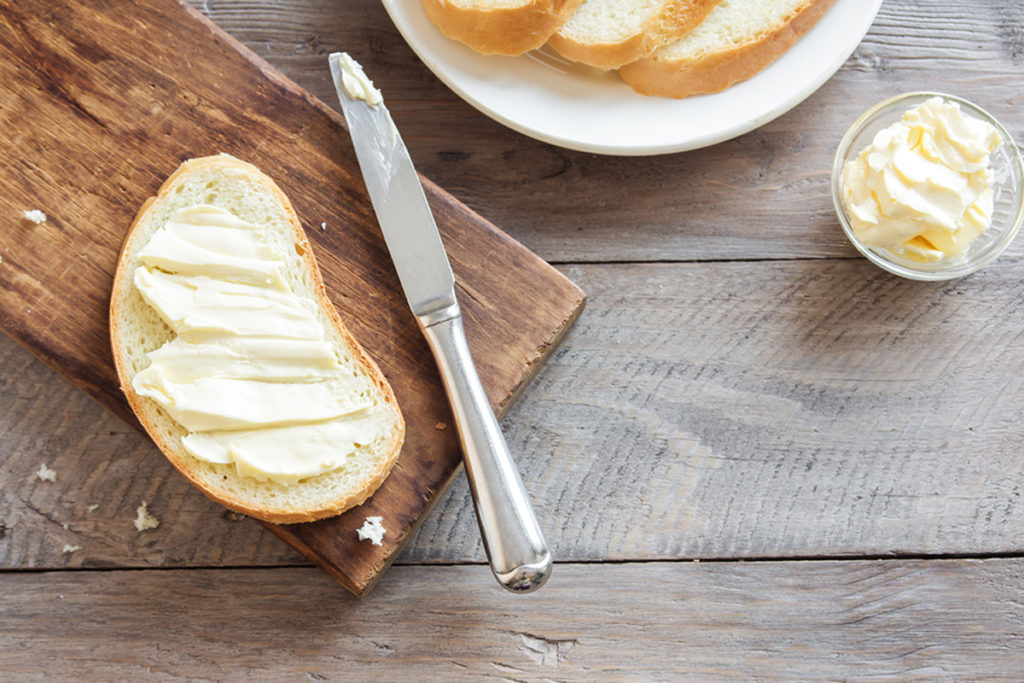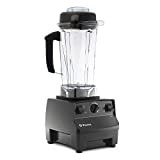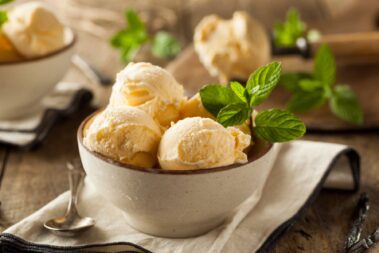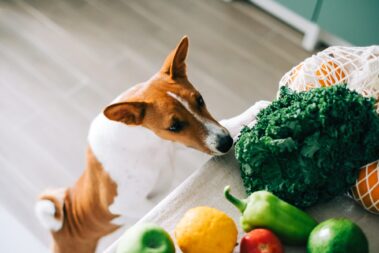Vegan butter used to be hard to find. Now, there are so many options it’s hard to know which to choose!
We spent some time rounding up the many plant-based butter options on the market to figure out which actually taste good. From those, we chose the top 7 best vegan butter brands to recommend to you.
Table of Contents
The Best Vegan Butters
1. Miyoko’s European Style Cultured Vegan Butter
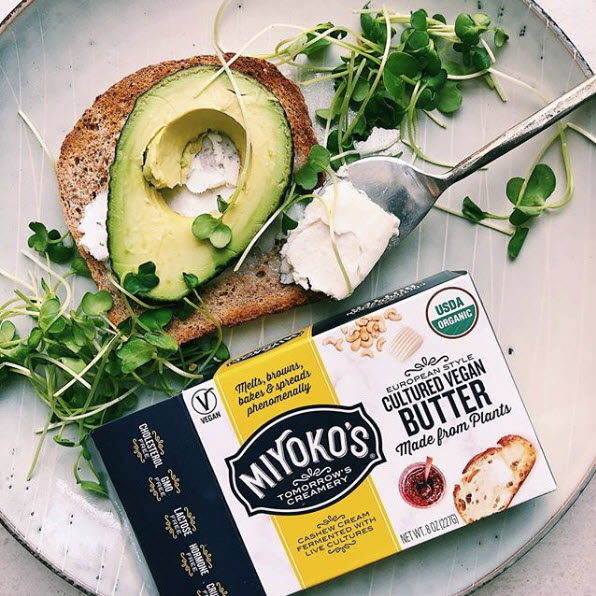
Made from plant-based ingredients and then fermented with traditional creamery live cultures, Miyoko’s Cultured Vegan Butter doesn’t merely taste like the real thing. It spreads, melts, and bakes like the real thing too.
If you’re looking for that undeniably creamy taste of butter without the dairy, you may have just found it. This is one of the best vegan butter substitutes when it comes to taste and versatility.
We love this product for spreading on bread and adding to savory dishes. But it also works well for baking. It does tend to brown a bit more than real butter, but this produces a chewy crispiness that works well for many delectable recipes.
Best for: Spreading and brown butter baking
Base ingredients: Coconut oil, sunflower oil, cashews
Calories per tbsp: 90
Find it at: Walmart, Target, health food stores
2. Melt Organic Butter
Melt Organic is committed to making butter that is better for people and the planet. And it tastes pretty good too.
If you are looking for a vegan alternative that still retains that buttery taste—think buttered popcorn flavor—this is one of the best options. It isn’t perfect but it is as close as you can get to replicating butter’s natural flavor and texture.
This spread does contain palm oil, but it is certified fair trade, organic, and Rainforest Alliance Certified. This butter is also pleasingly affordable. You, your wallet, and your tastebuds can feel good about eating this vegan butter!
Best for: Spreading and baking
Base ingredients: Coconut, palm (Rainforest Alliance Certified), canola, and sunflower oils
Calories per tbsp: 80
Find it at: Kroger
3. Earth Balance Original Buttery Spread
When it comes to flavor and usability, Earth Balance Original Buttery Spread really stands out.
It has a mild flavor that is slightly buttery and slightly salty, and overall very appealing. The texture is very butter-like and stays that way even at room temperature. This makes it a great product for baking a variety of different recipes.
On the downside, Earth Balance utilizes palm oil. While the company claims to support sustainable palm oil production, its products carry no certifications or guarantees to that effect.
Best for: Baking and spreading
Base ingredients: Palm (non-sustainable), canola, and soybean oils
Calories per tbsp: 100
Find it at: Most chain grocery stores
4. Kite Hill Plant-Based Butter
Kite Hill Plant-Based Butter is a European-style butter with a delightfully creamy texture and rich flavor.
European-style butter has a higher fat content and less moisture than standard butter. This vegan alternative matches that thicker, indulgent style without adding much in the way of calories. The pleasing texture and flavor make it one most real butter lovers really enjoy.
This palm-oil-free option is also pretty decent for baking. Like other coconut-oil-based butters, it doesn’t hold its form real well at high temperatures so would not be great for making frosting or recipes that require heavy whipping.
Best for: Spreading and baking (not for frosting or whipping)
Base ingredients: Safflower oil, almond milk, coconut oil
Calories per tbsp: 90
Find it at: Safeway, Whole Foods
Be sure to check out Kite Hill’s vegan sour cream and coconut milk yogurts, too.
5. I Can’t Believe It’s Not Butter Vegan
I Can’t Believe It’s Not Butter has been around for years. It was a popular dairy-free option long before the recent vegan diet trend. In fact, if you compare the labels of the original product versus the newer vegan product, they look identical.
While the vegan version may just be a new way of marketing an old product, it is Vegan Action Certified, which does provide some additional assurance for vegans. It also has a creamy, buttery taste you’ll love. Plus, it is very low in calories.
Unfortunately, like so many other name-brand vegan butter options, this one does contain palm oil. While there is no indication of this on the packaging or the website, Upfield, which owns the brand, insists that all their products use only RSPO certified palm oil. You can read more about their policies here.
Best for: Spreading
Base ingredients: Soybean oil, palm oil
Calories per tbsp: 60
Find it at: Most chain grocery stores
6. Country Crock Plant Butter
Like other name-brand butter and margarine companies, Country Crock has recently jumped on the vegan bandwagon with their new plant butter product.
Also like other name-brand attempts, this butter tastes pretty good. It comes in both a delectable spread that’s perfect for toast and in stick form that imitates butter well enough to be used in just about any recipe.
The main ingredient in Country Crock Plant Butter is palm oil. Like I can’t Believe It’s Not Butter, this brand is also owned by Upfield, which claims all their palm oil is RSPO certified.
Best for: Spreading and baking
Base ingredients: Palm oil
Calories per tbsp: 100
Find it at: Most chain grocery stores
7. Smart Balance Original
Smart Balance Original is one of those margarine-type butter alternatives that has been around for ages. But unlike those other options, this one actually tastes pretty good. And it is very high in omega fatty acid.
It is a spreadable butter but comes out of the fridge a tad hard. After a few minutes of sitting at room temperature, though, it has the perfect texture for dressing a warm English muffin. The taste is also fairly similar to butter but with far fewer calories.
Like other name-brand butter alternatives, this one contains non-sustainable palm oil as one of the main ingredients. It can be used for baking in some circumstances, but is better used as a spread.
Best for: Spreading
Base ingredients: Palm oil, canola oil, olive oil
Calories per tbsp: 80
Find it at: Walmart, Safeway
Things to Look For
Since you’re already looking for a vegan option, you might also be concerned with other health and environmental factors. Here are a couple to keep in mind.
Trans Fats
U.S. food manufacturers are no longer permitted to use trans fats in food products without FDA approval, but it’s something you should pay attention to on nutrition labels of products not produced in the U.S.
The primary source of trans fats is from partially hydrogenated oils, or PHOs, which are not Generally Recognized as Safe by the FDA and should be avoided. None of the options on our list contain PHOs.
Certified Sustainable Palm Oil
Palm oil is derived from the fruit of oil palm trees, which grows in tropical rain forests. In recent years, rain forests have been increasingly cleared to expand palm oil plantations, damaging important ecosystems in the process.
Although you don’t need to give up palm oil completely, you should look for the RSPO label to ensure you purchase products made with certified sustainable palm oil. Also, look for products with palm fruit oil instead of palm kernel oil, since the latter is much higher in saturated fat.
Needless to say, before you buy any of the listed products, you should do your own research to check that they align with your health and dietary goals.
FAQ
What dairy-free butter tastes most like butter?
According to our taste tests, Miyoko’s Cultured Vegan Butter tastes most like the real thing. It also behaves like the real thing. It’s easy to spread, melt, and bake with.
Is Country Crock plant-based butter good for you?
Vegan butters, like Country Crock, are made with plant oils, which have less saturated fat and tend to be better for you than dairy butter.
What is the healthiest vegan butter?
The healthiest vegan butter options contain high amounts of monounsaturated fats, such as what you’ll find in olive and avocado oil-based products. All butters (real and vegan) are high in calories and fat, but these options are better for your health than saturated fat-filled butter.
Put Your Favorite Vegan Butter to Use
Now that you have a list of some great vegan butters to try, here are a few vegan recipes featuring butter to help you put your new favorite product to use.
- Vegan Gingersnap Cookies – An easy and delicious treat for the whole family.
- Vegan Mashed Potatoes & Mushroom Gravy – So good, you’ll never guess these mashed spuds were vegan.
- Creamy Vegan Asparagus Pasta – Protein-packed and easy to make.
- Easy Vegan Sugar Cookies – Great for the holidays or any occasion.
- Easy Vegan Garlic Bread – Pair with our vegan vodka sauce pasta for a perfect meal.
If you like these recipes and our vegan product recommendations, be sure to sign up for our newsletter to get more like this delivered every week.
Which Butter is Best?
There are a lot of great vegan butters out there these days, with more options being added to the shelves each month. But not all taste that great and even fewer utilize only ingredients that are ethically sourced.
One that does meet this tough criterion that we absolutely can’t get enough of is Miyoko’s Cultured Vegan Butter. Not only does this spread taste and bake like real butter, but it is made with quality ingredients we can get behind.
Coming in at a close second is Melt Organic Butter. This is an even better option for baking with a decent butter flavor. And all the ingredients are organic and sourced with the planet in mind.
If you’re looking for a taste or texture store-bought vegan butter can’t quite reach, don’t fret. You can always make your own vegan butter. We’ll show you how below.
What’s your favorite vegan butter brand? Let us know in the comments section following the printable recipe card.
How to Make Your Own Vegan Butter
As great as these vegan butter brands are, making your own vegan butter at home is easy and ensures you know exactly what’s in it. Our recipe below (created by Kirsten Nunez) is buttery, smooth, and creamy, and it works great as a spread or as an ingredient in your favorite recipes.
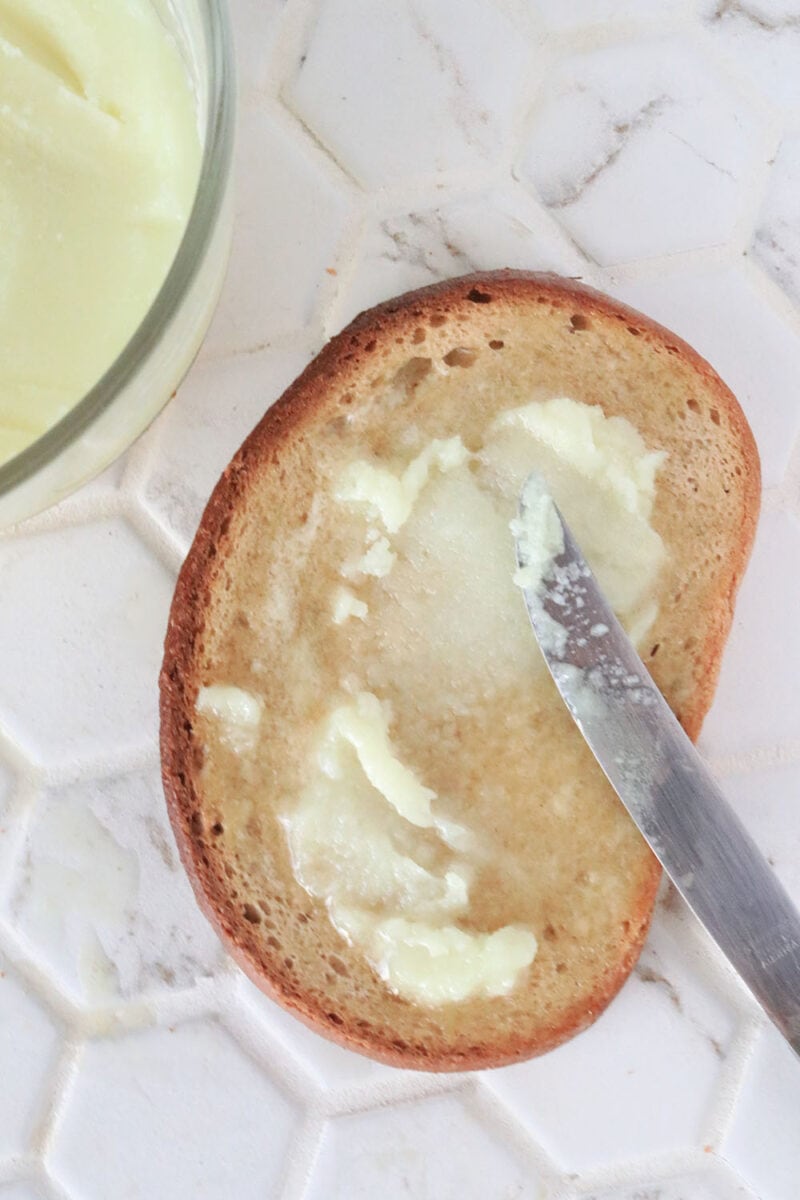
Key Ingredients
- Melted refined coconut oil. This ingredient is the base of homemade vegan butter. It’s important to use coconut oil that’s refined, which will prevent your butter from having a coconut flavor. Also, be sure to use melted coconut oil that’s at room temperature. If it’s too hot, it will take longer to set (and be more likely to separate). On hot days, your coconut oil might already be melted and liquid in its jar.
- Non-dairy milk. Use your favorite unflavored, plain dairy-free milk. We used oat milk for our butter.
- Lemon juice. Lemon juice gives the butter a slightly tangy taste. You can use apple cider vinegar as a substitute.
- Sunflower lecithin. Sunflower lecithin is essential for emulsifying (combining) the liquid and oil in this recipe. Soy lecithin also works well. Typically, sunflower and soy lecithin can be found in the supplement section of health food stores.
Recipe Steps
1. In a small bowl, combine the milk and lemon juice or apple cider vinegar, but avoid stirring. Let sit for 4 to 5 minutes to let the milk curdle.
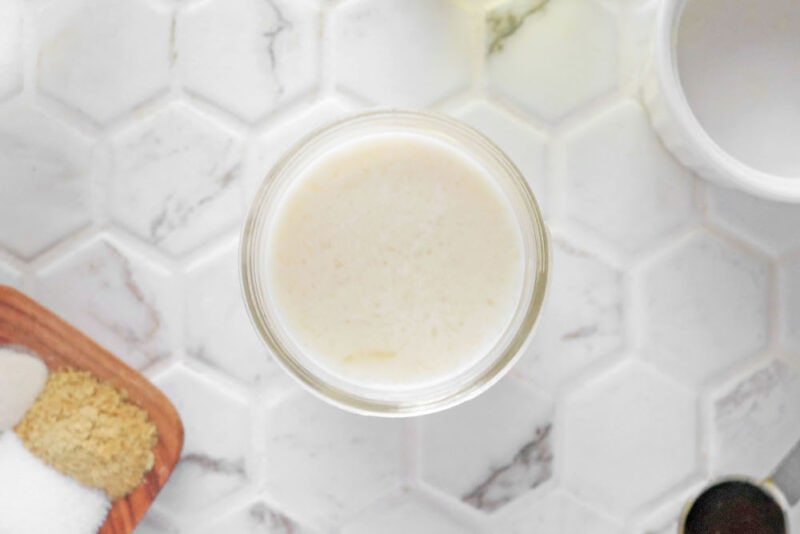
2. In a blender, combine the melted room temperature coconut oil, milk mixture, and remaining ingredients. Blend until smooth and combined, scraping down the sides as necessary. There should be little to no flecks of sunflower lecithin remaining.
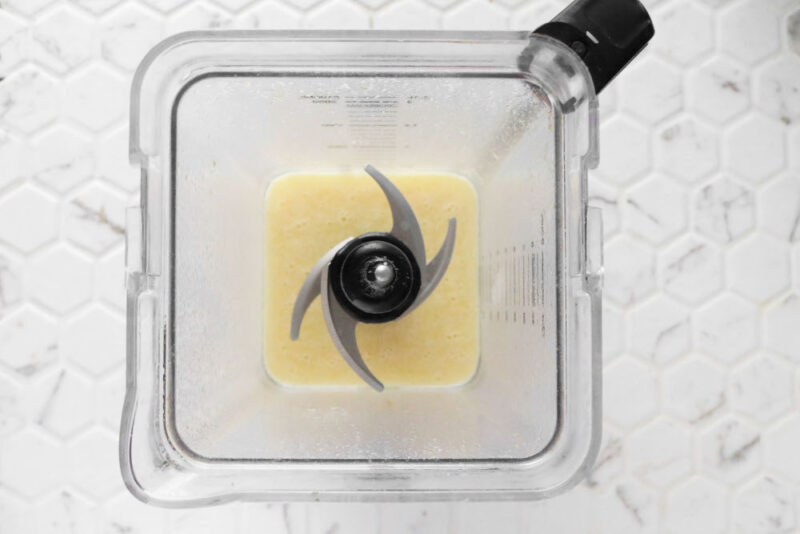
3. Pour the mixture into your chilled container. Loosely cover, then place in the freezer for 30 to 45 minutes to help jumpstart the setting process. Transfer to the refrigerator, then chill for 1 to 3 hours or until completely set. The exact time depends on the size of your molds.
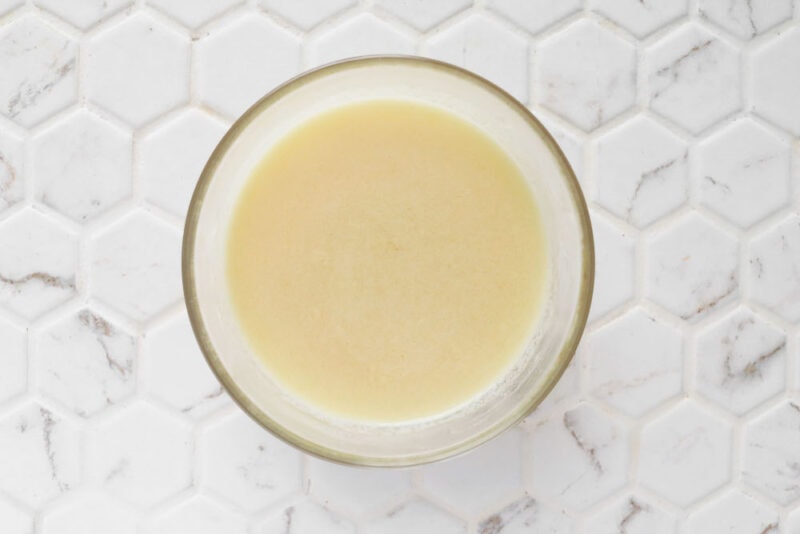
4. To use your vegan butter, remove it from the refrigerator. Let sit until it reaches room temperature and becomes spreadable.
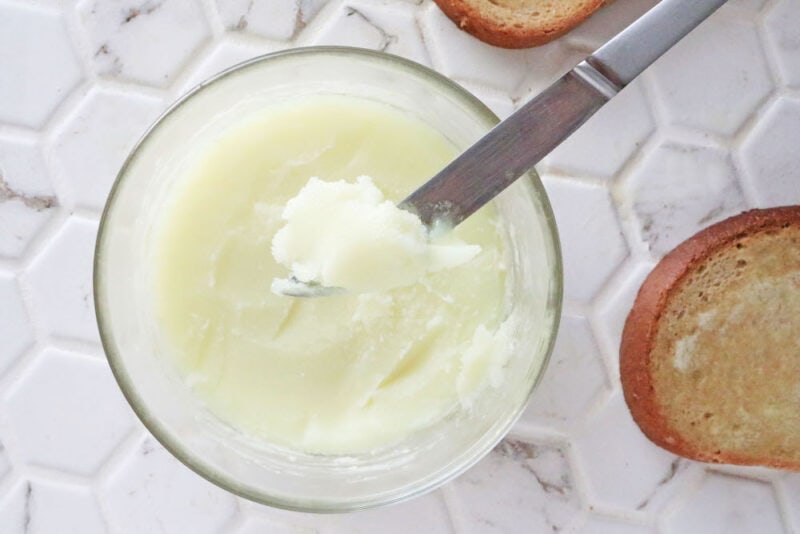
Recipe Tips
- Use a silicone mold. If you want to remove the entire chunk of butter from its mold, be sure to use a silicone mold. Otherwise, a glass container works great if you want to spread or scoop your butter.
- Make smaller portions. If you plan to use your butter in smaller servings (like for toast or occasional cooking), use a silicone ice cube tray as a mold. Keep the smaller portions frozen until you’re ready to thaw and use them.
- Adjust the salt. Use less salt if you want unsalted butter, or more for extra saltiness.
How to Store It
Store leftover vegan butter in a covered container in the refrigerator for up to 7 days. You can also freeze it for up to 3 months.
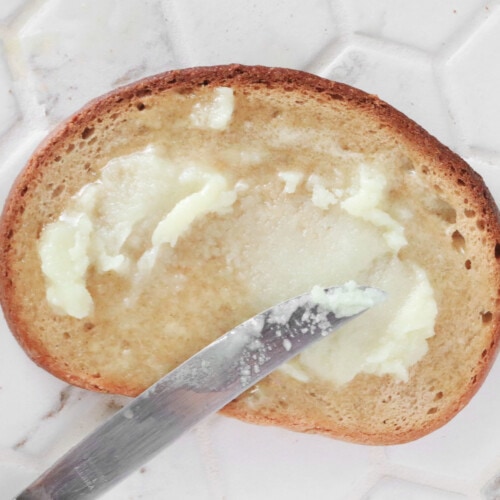
How to Make Vegan Butter
Ingredients
- 1 cup refined coconut oil melted
- ½ cup plain non-dairy milk plain
- 2 tsp lemon juice or apple cider vinegar
- ¼ cup canola oil
- 1 tsp nutritional yeast
- 1.5 tsp sunflower or soy lecithin
- ¼ tsp xanthum gum
- ¼ tsp salt
- ⅛ tsp turmeric for color
Instructions
- In a small bowl, combine the milk and lemon juice or apple cider vinegar, but avoid stirring. Let sit for 4 to 5 minutes to let the milk curdle.
- In a blender, combine the melted room temperature coconut oil, milk mixture, and remaining ingredients. Blend until smooth and combined, scraping down the sides as necessary. There should be little to no flecks of sunflower lecithin remaining.
- Pour the mixture into your chilled container. Loosely cover, then place in the freezer for 30 to 45 minutes to help jumpstart the setting process. Transfer to the refrigerator, then chill for 1 to 3 hours or until completely set. The exact time depends on the size of your molds.
- To use your vegan butter, remove it from the refrigerator. Let sit until it reaches room temperature and becomes spreadable.
How to Store Vegan Butter
- Store leftover butter in a covered container in the refrigerator for up to 7 days. You can also freeze it for up to 3 months.
Notes
- It’s important to use coconut oil that’s refined, which will prevent your butter from having a coconut flavor.
- If you want to remove the entire chunk of butter from its mold, be sure to use a silicone mold. Otherwise, a glass container works great if you want to spread or scoop your butter.
- If you plan to use your butter in smaller servings, use a silicone ice cube tray as a mold. Keep the smaller portions frozen until you’re ready to thaw and use them.
- Use less salt if you want unsalted butter, or more for extra saltiness.
Nutrition
- How to Pick the Perfect Watermelon For a Sweet Summer Treat - April 10, 2024
- Future Kind’s Foundations: A Multivitamin Made for Vegans - December 5, 2023
- Does Nutritional Yeast Go Bad? - November 28, 2023

